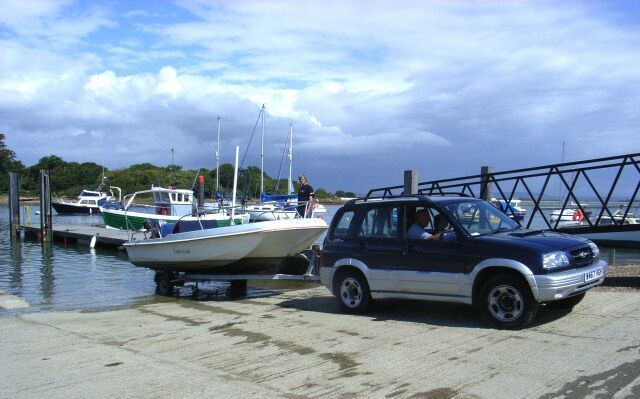Boat storage options and costs
It’s wise to think about boat storage before you purchase a boat, as storage costs on or off the water can quickly add up.

Storage options
You can buy a very decent budget boat on a trailer for £5,000 or less. Choose to berth in a marina and you could end up paying that amount again every year just to store it. That’s before any other costs are taken into consideration.
So it pays to look at various storage options and pick one that satisfies your requirements and your budget. Since we’re talking about budget boating it’s likely you will be looking at boats that fit on a trailer which increases the number of options:-
- At home on a trailer
- Boat park on a trailer
- Marina hard standing on a trailer
- Dry stack (pictured above)
- Mooring
- Marina
Cost comparison
Prices are usually based on ‘length overall’ (LOA) so if the boat is staying on a trailer you need to pay for the combined length from the tip of the tow hitch.
This table shows the cost for each option based on a 6 month term for my boat (7.4m LOA) at various local facilities (valid June 2020)
| Option | Cost |
|---|---|
| At home on trailer | free |
| Boat park on trailer | £360 |
| Mooring | £600 - £1,100 |
| Marina on trailer | £1,200 |
| Marina berth | £1,700 - £3,600 |
| Dry stack | £2,500 |
As you see, the paid options range from £360 to ten times that amount!
Other considerations
Mooring costs vary as they may be semi-tidal meaning your boat sits in the mud until the tide comes in. Marina costs are generally high around the Solent - it’s one of the most popular areas in the country for sailing as well as powerboating.
Dry stacks and moorings may be some distance from the main body of water and restricted by the tide. Combined with speed restrictions in and around ports, this can add significant time to journeys to and from a berth.
If you keep the boat at home you may still need to pay to launch. Some slipways including the one at Hythe Marina are free to use but you must pay for parking.
Prepare to launch
A marina berth or mooring means you can ‘park and ride’. Dry stacks provide the same level of convenience though you have to book in advance so your boat can be launched ready for your arrival. Unless you are in a marina, you will still need to check tides as many dry stacks and moorings are in tidal or semi-tidal locations.
Smaller boats are relatively easy to launch and recover from a trailer but this does need practice. Many slipways are busy so you need to launch as quickly as possible and park your trailer out of the way.

Find a quiet slipway like this with an adjacent pontoon, so you can tie up the boat easily as soon as it floats off the trailer.
Budget option
Boat parks give you quick access to the water and facilities and remove the need to tow back and forth from home. Launching and recovery from a trailer is still needed of course but this is a good skill to practice.
I chose this option as it is relatively affordable at the equivalent of £2 per day over a 6 month period. Fresh water is available to flush my outboard after every trip, and the boat can be left on the trailer without the need to attach ratchet straps and lightboard.
Links
A nice video from Stu at Dangar Marine showing how to launch and recover a trailer boat